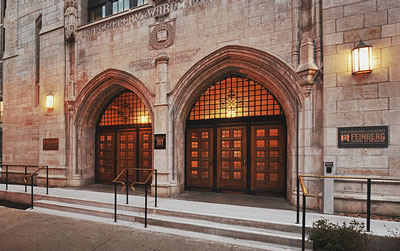Byline: Nora Dunne
-

Decoding Signaling Pathways that Lead to Scar Tissue
The loss of a component of a protein complex responsible for attaching cells together activates genes that lead to the buildup of fibrous scar tissue seen in cardiac disease arrhythmogenic cardiomyopathy, according to a recent study.
-

Important Action Behind Cell Division Uncovered
Research led by Northwestern Medicine scientist Daniel Foltz, ’01 PhD, sheds light on the assembly of centromeres, a region of the chromosome that helps ensure new cells have 46 chromosomes.
-

Feinberg Rises in Medical School Rankings
Feinberg has moved up two spots to become the 17th best medical school in the country for research, according to the latest U.S. News & World Report rankings.
-

Rescuing Damaged Neurons in Parkinson’s Disease
Northwestern Medicine scientists shed light on a hallmark of Parkinson’s disease that has been poorly understood, the buildup of a protein called α-synuclein in the brain.
-

Testing a New Therapy for Advanced Blood Cancer
A recent clinical trial conducted by Northwestern Medicine investigator Seema Singhal, MD, showed that the drug daratumumab is a safe and effective treatment for patients with advanced multiple myeloma.
-

Crucial Step in Red Blood Cell Development Discovered
New Northwestern Medicine research has revealed a surprising phenomenon behind the production of red blood cells: an opening that forms on the nuclear membrane to condense chromatin.
-

New Northwestern Institute Commits to Improving LGBT Health
The Institute for Sexual and Gender Minority Health and Wellbeing is the first research institute in the United States established university-wide that is focused exclusively on LGBT health.
-

New Intravaginal Ring Enhances Drug Delivery
A team left by Northwestern Medicine biomedical engineer Patrick Kiser, PhD, designed an intravaginal ring equipped with a novel drug release mechanism that enables the delivery of a diverse array of drugs for extended durations.
-

Nanoparticles Destroy Cancer With Mechanical Force
By rotating special magnetic nanoparticles injected into brain tumors, a team of scientists led by Northwestern Medicine neurosurgical oncologist Maciej (Matt) Lesniak, MD, successfully damaged tumor cells in animal models.
-

Kibbe to Lead Surgery Department at UNC School of Medicine
Melina Kibbe, MD, ’03 GME, Edward G. Elcock Professor of Surgical Research, will be chair of the Department of Surgery at the University of North Carolina School of Medicine.






